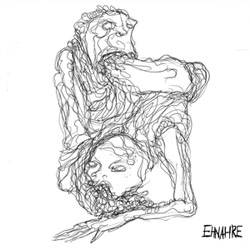
Keith Rowe - guitars, electronics
Franz Hautzinger - slide trumpet
Axel Dörner - quatertone trumpet
Press release from Erstwhile: April 2004
Trumpeters Axel Dörner and Franz Hautzinger transcend many of the aesthetic and geographical factions that have evolved over four decades of European free improv, contributing their gorgeous tones to a wide variety of contexts. On A View From The Window, they join forces with the intensely focused Keith Rowe, one of the sceneÕs founding fathers, and explore the abstract limits of their respective palettes.
RoweÕs history should be familiar to anyone following this area of music. Having mostly performed within AMM until the late nineties, heÕs since been involved in a wide range of projects, including a slew of the most prominent Erstwhile releases. HeÕs the cornerstone musician for the label, and is co-curating the upcoming AMPLIFY festival in Cologne and Berlin, AMPLIFY 2004: addition.
Dörner hails from Cologne, and has been living in Berlin since 1994. He is one of the busiest musicians in the European improv scene, working in projects ranging from free improv ensembles like the Territory Band and The Electrics to more abstract ensembles such as Phosphor and Lines. He recently put out a superb trio disc on Creative Sources with Boris Baltschun and Kai Fagaschinski. This is his second project for Erstwhile, following the self-titled duos with Kevin Drumm, released in 2001.
Hautzinger, based in Vienna, has recorded numerous projects for Grob, including the solo Gomberg, a duo with Derek Bailey, and Absinth (a quartet with Werner Dafeldecker, Sachiko M, and John Tilbury). He has worked with an impressive diversity of musicians, including Gil Evans, John Cale, Christian Fennesz, Otomo Yoshihide, Butch Morris, Phill Niblock, Lou Reed, and the Temptations. This is his first project for Erstwhile.
A View From The Window was recorded in a single day in Vienna in November 2003 by Christoph Amann, superbly as always. The CD captures these three musicians paring their signature sounds down to their essences, with the occasional plaintive trumpet cry or subtle radio snippet emerging from the delicate intertwining. Photojournalist Yuko Zama was in attendance for the sessions, and became drawn to the glimpse of sky visible through one of the studioÕs windows. She took dozens of pictures from different angles, and her fascination inspired Rowe to title the record after the Cardew quote (see below), and to paint a more 'optimistic' version of one of her photos for the front cover.
"...it is impossible to record with any fidelity a kind of music that is actually derived from the room in which it is taking place - its size, shape, acoustical properties, even the view from the window..." - Cornelius Cardew, Towards an Ethic of Improvisation
Here
 ART ENSEMBLE OF CHICAGO - Chi-Congo (Paula Records, 1973)
ART ENSEMBLE OF CHICAGO - Chi-Congo (Paula Records, 1973)





























